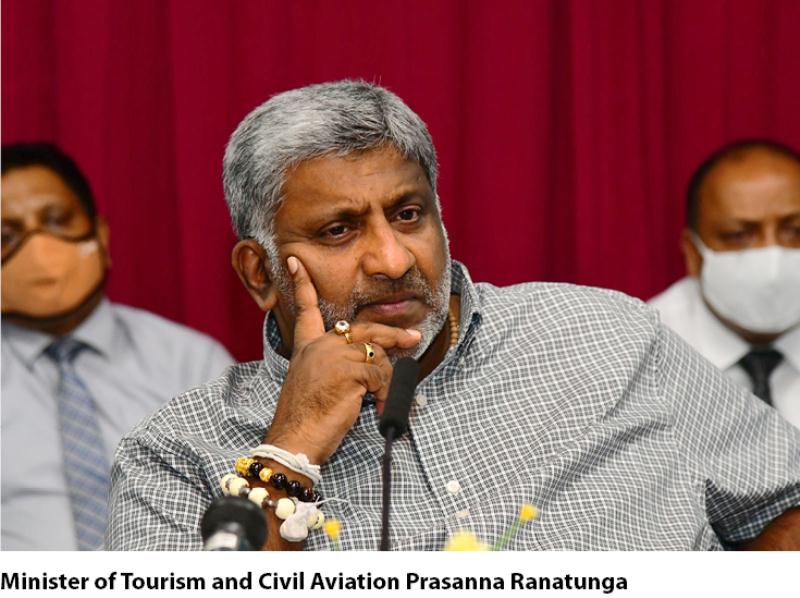By Madhusha Thavapalakumar
The one-year moratorium that was announced for tourism sector businesses following the Easter Sunday attacks last year is likely to be extended, according to the Minister of Tourism and Civil Aviation Prasanna Ranatunga.
Speaking to The Sunday Morning Business, Ranatunga noted that the moratorium might be extended further considering the adverse effects of Covid-19, especially on the tourism sector.
“We might extend it. We had some discussions on this but we should get the request initially from the Sri Lanka Tourism Development Authority (SLTDA),” Ranatunga added.
To ascertain the SLTDA’s position, we contacted its Chairperson Kimarli Fernando who told us that SLTDA is in discussions with the relevant authorities to extend the moratorium further.
“We are discussing this with the Treasury along with several other relief measures for the tourism sector but as of now, nothing has been approved or finalised,” Fernando added.
Following the Easter attacks last year, the Government announced subsidised working capital and a one-year moratorium for loans taken by tourism sector businesses despite requests from the industry to grant a two-year moratorium.
Accordingly, the moratorium was authorised until 31 March 2020 for both capital and interest payments. As of 31 May 2019, banks had received about 1,055 applications. The tourism exposure to banks is about Rs. 62 billion, out of which Rs. 26 billion was considered for the moratorium, according to the Central Bank of Sri Lanka (CBSL).
However, even before the expiry of the moratorium, tourism bodies including The Hotels Association of Sri Lanka (THASL) had requested the Government to extend it by another year as Covid-19 has entirely disrupted the recovery of the tourism sector, which was hit hard by the Easter attacks.
The requests were initially made in early January this year, when Sri Lanka’s tourism arrivals began to trend downwards due to Covid-19-induced lockdowns of cities in the original epicentre of the virus, China, and travel restrictions on Chinese nationals by the Chinese Government. China has long been one of the top three tourism-generating markets of Sri Lanka.
A few weeks later, the virus also restricted global travel for people around the world. The virus has since then gradually spread to over 200 countries including Sri Lanka, prompting the closure of the Bandaranaike International Airport (BIA) for arriving passengers.
Even though the Government is yet to approve the request from THASL, the Government announced a couple of relief measures for several sectors including the tourism sector as well, taking the impact of Covid-19 on the economy into account.
Accordingly, credit facilities such as term loans, leasing facilities, pawning, overdrafts, and trade finance facilities of small and medium-sized enterprises (SMEs), tourism, apparel, plantation, IT, and related logistic service providers will be given a debt moratorium for six months. These sectors were also granted 4% working capital loans. Further, due to the effect of Covid-19 on the tourism industry, the SLTDA has waived off the annual renewal of the guide license fee for the year 2021.
Commending these efforts by the Government, THASL President Sanath Ukwatte, early this month, requested the Government to consider a six-month Government-sponsored wage support scheme to those earning a monthly wage of Rs. 40,000 or less and also requested the six-month debt moratorium to be expanded until tourism rebounds.
Ukwatte’s requests also included the continuation of working capital loans at 4% interest with long-term payback, waiving off all Employees’ Provident Fund (EPF)/Employees’ Trust Fund (ETF) penalties of tourism businesses until April 2021.
The tourism sector has been given plenty of concessions and relief by the Government since the Easter Sunday attacks last year. In addition to the one-year moratorium, Easter Sunday tourism sector relief packages offered working capital loans up to Rs. 250 million, based on turnover. The Government bore 75% of the interest component until 31 March 2020 and offered a concessionary interest rate of 3.4%.
In May 2019, an interest-free loan up to Rs. 0.5 million was made available for the informal tourism sector including small-scale hotels, inns, and service providers. The repayment period of the loan was three years with a grace period of one year.
Further, Value-added Tax (VAT) on hotels and tour operators registered with the SLTDA was reduced to 5% from 15% from 1 April 2019 to 31 March 2020.
In February this year, the Government extended the deferral period for hotels registered under the SLTDA to pay their 1% levy on turnover for four months. The Government earlier gave a six-month deferral period in the wake of the Easter Sunday attacks; by 31 December 2019.
Tourism arrivals were gradually recovering after the Easter attacks and reported arrivals into the country stood at 1.9 million in 2019, compared to 2.3 million in 2018. This year, January arrivals were 228,434, a year-on-year drop of 6.5%, while February arrivals were 207,507, a year-on-year drop of 17.7%.


